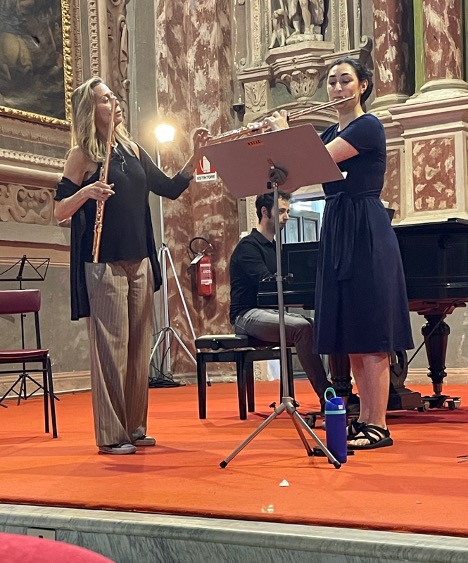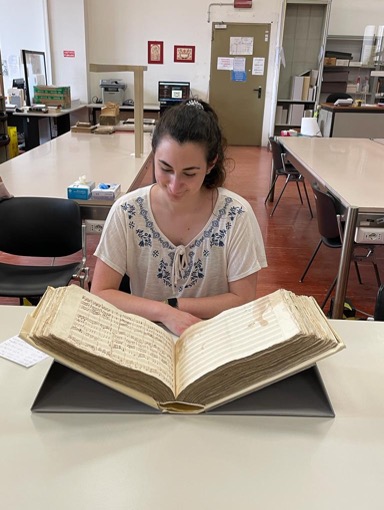Guest Blog: Julia Escobar’s Italian Adventures

Course participants and guest artists in The Complete 21st Century Flutist: The Global Artist. (Julia Escobar second row center in red.)
This summer, I am grateful to have had the opportunity to travel to Italy to study flute and piccolo for over a month. I attended two programs in northern Italy. The first was The Complete 21st Century Flutist in Mondovì, a small village in the Piemonte region, about an hour inland from the northwestern border. The second was the International Piccolo Festival in Grado, a small beachy island town in the Friuli-Venezia Giulia region, near the northeastern border. I will provide a brief summary of my colorful musical experiences in Italy.
The Complete 21st Century Flutist: The Global Artist is a study abroad program hosted by California State University within their summer course series called “Summer Arts.” Summer Arts has a myriad of courses that rotate yearly. For example, this year, in addition to their flute and piccolo course in Italy, they hosted a guitar course in Spain, along with theatre, writing, and other music courses in California. I had taken this course in an online format in summer 2021, and I looked forward to attending it in person for its first iteration in Italy. It did not disappoint!

In a master class with Marina Piccinini (Peabody Conservatory).
The course coordinator, Rena Urso (also a flutist/piccoloist/Body-Mapping instructor/yoga teacher, among other things), did a fantastic job garnering a crew of diverse flute professionals from around the world to teach us in rotation over the course of three weeks. The guest artists included Heather Clark (USA), Marina Piccinini (USA/international), Gudrun Hinze (Germany), Adriana Ferreira (Italy/Portugal), and Snježana Pavićević (Serbia), to name a few. The program is aptly titled. Lectures, master classes, performances, and activities were geared towards learning and focusing on many aspects of being not just a flutist but a whole artist. Content ranged from historical performance, to piccolo playing, to freelance work, to body awareness through Alexander Technique and Body Mapping, and more. Beyond that, the quiet medieval village of Mondovì was a welcoming, beautiful, andd serene place to be.

Day trip to a library in Torino that houses some of Antonio Vivaldi’s original manuscripts for flute and recorder (piccolo).
After this course, I spent 10 days traveling to Torino, Milano, and Venezia for some sightseeing with my mom. Then, it was onto the piccolo festival in the charming, sunny city of Grado.
The International Piccolo Festival quite a different experience, with this festival lasting only five days. It was more like a conference than a course for college credit. This festival is also appropriately named. Professional piccolo teachers hailed from the Netherlands/Germany (Simone Bodoky-van der velde), Dallas, USA (Ebonee Thomas), Italy (Nicola Mazzanti), and Switzerland (Pamela Stahel and Marina Wiedmer). These are wonderful piccolo players with professional orchestral and collegiate teaching experience. Students also came from all over the world, including Switzerland, Italy, Slovenia, and Brazil. I was one of just two students from the USA. The days were filled with lessons, workshops, guest interviews, and nearly each night had a concert. In the opening night concert, I partcipated in a performance of Vivaldi's Four Seasons arranged for flute orchestra (transcribed for piccolo soloist and flute orchestra, complete with contrabass flutes). Four of the five guest artists were soloists, with each performing a respective season. This program’s artistic director is Nicola Mazzanti, one of the top piccolo players in the world and a prominent piccolo teacher. He’s published valuable editions, recordings, and books. I frequently use his book The Mazzanti Method: Daily Exercises for Piccolo in my own practice. I definitely recommend both this festival and the Summer Arts course to interested flutists.

Students in the festival perform with the Falaut Flute Orchestra, an Italian group conducted by Paolo Totti.
Last but not least, an added bonus to participating in these programs is that I got to connect with experts who could be resources for my final doctoral project. I was privileged to speak with piccolo professionals who have experience in my area of research, so I hope to stay in touch while I finish my project in Illinois.
It is hard to encapsulate my experience of 39 days in Italy; to say it was unique and memorable is an understatement. In total, I studied with 12 flute and piccolo players who were truly inspirational and informative. I took many notes, and I look forward to incorporating what I learned in my future teaching. Attending these two programs towards the end of my doctorate helped to culminate, complement, and provide deeper insights to what I’ve learned studying flute over the years. Although it was not perfect, as life is far from it, I believe these experiences abroad will have made me a better musician, teacher, and a more well-rounded person. I have gained friends and connections that I hope to keep for years to come. Plus, now I can speak just a few more Italian words than musical terms. Ciao!
Below you can listen to an arrangement for four flutes and piano of a choral piece by Lili Boulanger, "Soir sur la plaine," arranged by Jonathan Rodriguez, featuring Jonathan Rodriguez, Julia Escobar, Samantha Trentacoste, Saqtiel Orozco-Pedroza, and Eun Mi Park on piano. The quartet performed the piece as part of the final concert of the course in Mondovì.
Julia Escobar is the first John Frayne Classical Music Graduate Student Work Experience Fellow at Illinois Public Media. She is currently studying for her doctorate in Flute Performance and Literature at the University of Illinois. Originally from Austin, Texas, Escobar received her master's degree from the University of Illinois and her bachelor's degree from Texas State University.



